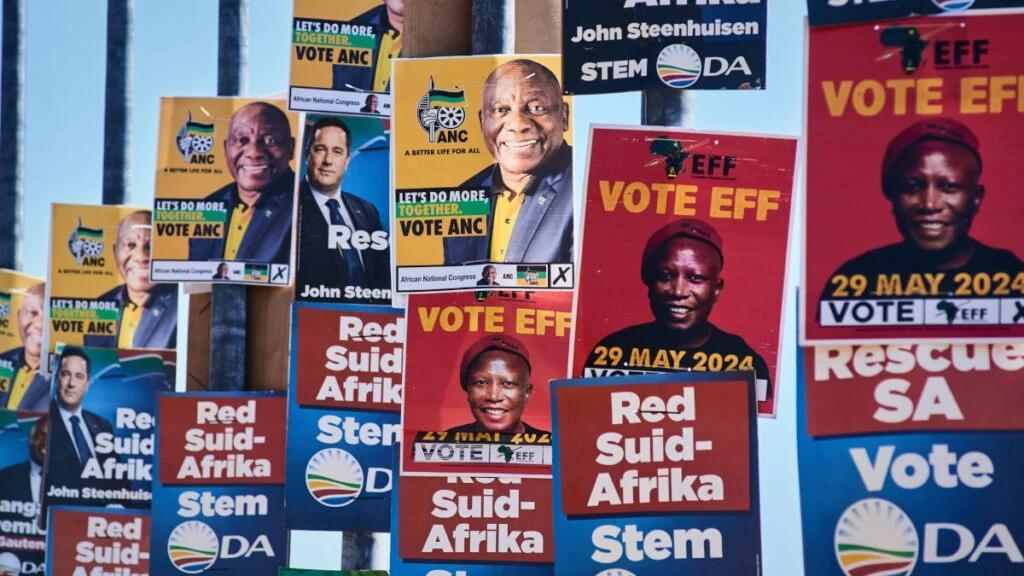Africa-Press – South-Africa. With South Africa’s general elections less than a week away, BusinessTech has looked at several manifestos to see what parties are promising to do around several pressing issues.
Below is a brief summary of the plans and promises of 11 political parties for creating jobs and boosting the economy.
African National Congress (ANC):
Industrialisation and Economic Development: Advance industrialisation, focus on labor-intensive strategic industries, cultivate partnerships for domestic industry development, expand the black industrialist programme, increase exports, accelerate land reform.
Support for Small Businesses and Entrepreneurship: Support small businesses owned by women, youth, and persons with disabilities, increase government support for entrepreneurs, engage the private sector in job creation.
Job Creation and Employment Opportunities: Create 2.5 million work opportunities through the Presidential Employment Stimulus and funding to civil society, and expand the National Youth Service.
Infrastructure Development and Logistics Improvement: Address and fix energy, transport, and logistics constraints through government investment and public-private partnerships.
Policy Alignment and Transformation: Align monetary, fiscal, and trade policies with financial sector transformation, as well as promote and monitor employment equity for black people, women, and persons with disabilities.
Democratic Alliance (DA):
Labour Market Reforms: Overhaul of Labour Relations Act, create apprenticeship category for skills development, and remove BBBEE and race targets in employment and procurement laws.
Tax System Reforms: No new taxes commitment, have inflation-adjusted brackets, and expand zero-rated food basket and enhanced tax enforcement against fraud.
Public Finance Management: Stabalise public debt through fiscal rules, efficienct and responsible government spending, have a balanced approach to state-owned enterprise privatisation, and encourage employee savings programmes.
Red Tape Reduction: Establishment of “One-Stop-Shops” for small businesses, streamline regulations for informal traders and expedited licensing.
Economic Development: Prioritise infrastructure via public-private partnerships, implement horizontal industrial policy, strengthen trade connections via international agreements, create an export-oriented economy, oppose localisation policies.
Create an open electricity market: Improve power supply reliability by unbundling and restructuring Eskom, transitioning away from power generation, investing in grid infrastructure, and promoting a diversified energy sector.
Introduce a Youth Employment Opportunity Certificate: Targets 18-35 age group, offering flexible employment terms. Valid for two years, allowing for exemptions from minimum wage requirements and sectoral wage agreements.
Economic Freedom Fighters (EFF):
Establishment of State-Owned Companies for Job Creation: Establish state-owned companies for housing, roads, security, cleaning, horticulture, and landscaping, and insource security personnel.
Economic Zones and Procurement Policies: Declare special economic zones with job creation incentives, mandate a minimum of 80% domestic procurement by the state, 50% local beneficiation of mineral resources, mandate shops to sell at least 60% locally produced goods, introduce a three-shift system to operate the economy 24/7.
Support for Small Enterprises and Workers: Support SMMEs, protect street hawkers, guarantee a minimum wage and pension contributions.
Policy Reforms and Employment Programs: Promote at least 50% unionisation of businesses, state procurement benefits women and youth-owned companies, and stipends for degree or diploma holders.
Local Economic Development and Tax Policies: Revive and expand industrial zones, create tax-free zones in townships, enforce local procurement and localisation policies, Promote local production and processing of food, local production of goods for state projects.
Job Creation Initiatives in Specific Regions: Declare specific areas as special economic zones with job creation incentives.
Inkatha Freedom Party (IFP):
Employment and Local Production: Promote an 80/20 hiring policy favoring South African citizens in companies, prioritise them for entry-level and low-skill jobs, and reserve the small enterprise and spaza shop sectors for South Africans, while also focusing on supporting locally-produced products and industries.
Support for Businesses, Economic Development and Labour: Exempt SMMEs from different labour requirements and reduce red tape, revamp local economic development, restructure the Small Enterprise Development Agency, introduce a grant for rural and township business cooperatives, and overhaul labour legislation.
Graduate Employment and Skills Development: Roll out an Unemployed Graduate Grant, and introduce more graduate internships in public sectors.
Agricultural, Rural and Industrial Development: Support small-scale farming, support expansion of various industries, including cannabis and hemp for economic growth and recognise traditional leaders’ role in land management.
Fiscal Management, State-Owned Enterprises and Energy Sector: Promote fiscal restraint and limit public debt, refuse further bailouts for SOEs, foster competition and innovation, and form public-private partnerships, open energy market and diversify energy generation.
Infrastructure Investment and Banking Reform: Invest in infrastructure to create a conducive environment for investors, and revitalise Ithala Bank.
Vryheidsfront Plus (VF Plus):
Fiscal Responsibility and Efficiency: Limit state expenditure, privatise state-owned enterprises, such as Eskom, offer tax relief to individuals and businesses, establish a fiscal commission with the power to, among other things, adjust the VAT rate, government should earn tax; not simply collect it.
Tax and Insurance Reform: Do away with the RAF and replace it with legislation that compels motor vehicle owners to take out third-party insurance, decrease the fuel levy and use it only for transport infrastructure development, and tax rebates for businesses and individuals who fulfil government functions.
Labour Reforms: Amend rigid labour legislation, prevent unfair labour practices, abolish transformation targets and focus on development instead, and create a favorable environment for job creation through government policy that stimulates economic growth and promotes the free market.
Empowerment and Economic Development: Use poverty as a basis for empowerment, use growth and development, rather than racial targets, as methods of empowerment, develop independent local economies, create Special Economic Zones exempt from “restrictive labour laws”, and offer community-based social services.
ActionSA:
Infrastructure Development and Investment: Boost exports and the industrial sector by investing in rail line extensions and port improvements, encourage private sector involvement by simplifying regulations and repurposing reclaimed buildings for development, and reprioritise the budget towards infrastructure and service improvement.
Small Business Development: Support business innovators and job creators through investment in SMMEs, empowering the informal economy, and providing affordable business spaces to stimulate economic activity.
Labour Reforms: Labour market reforms, including changes to the Basic Conditions of Employment Act, exemptions for SMMEs from certain requirements, and minimum wage adjustments to boost youth employment.
Global Trade Expansion: Prioritise foreign investment and international trade, supporting domestic industries, and strengthening trade connections with other African countries.
Rural Economic Development: Boost rural economies through land reform, skills development, infrastructure investment, and diversification of employment opportunities, including promoting rural tourism.
Private Sector Partnerships: Enhance collaboration between public and private sectors through streamlined processes, tax incentives, and support for public-private partnerships, prioritising upskilling and knowledge transfer for sustainable growth.
Rise Mzansi:
Economic Development and Job Creation: Foster an inclusive economy by fixing government finances, boosting entrepreneurship, revitalise key sectors, and promote green industries, tourism, and creative economies, including cannabis, hemp, and advanced manufacturing. Enhance support for black women-owned and small enterprises, and improve aid for informal businesses and smallholder farmers.
Education and Skills Development: Focus on improving education outcomes and providing skills training, and invest in human capital, technology, and innovation.
Regulatory and Governance Reform: Address municipal governance issues to encourage investment, simplify regulations and improve efficiency in licensing and approvals, utilise government procurement to support black and women-owned companies and address anti-competitive practices.
Infrastructure and Energy Reform: Reform Transnet and Eskom, prioritise solar energy, and improve water infrastructure as these are seen as the biggest constraints to economic activity.
Safety and Security: Invest in fighting crime to ensure safety for businesses.
Build One South Africa (BOSA):
Stimulating Employment in Disenfranchised Communities: Address spatial economic exclusion inherited from apartheid, provide infrastructure support for business development, create Township Special Economic Zones, and invest in entrepreneurs and technical skills development.
Workforce Development: Provide technical skills for industrialisation, ensure access to skilled labor through immigration policies, promoting job creation through SMME support and venture capital, establishing a Jobs and Justice Fund for empowerment initiatives, fund on-the-job training for individuals without matric, and introduce a voluntary national civilian service program for post-matriculants
Innovation and Research: Invest in research and development for innovation, and support inspirational ventures in advanced sectors.
Regulatory Reform: Address regulatory deficiencies hindering economic growth, such as unnecessary red tape.
Address energy challenges to boost economy: Initially tackle electricity issues, then broaden focus to the entire energy sector, promote accountability, transparency, and participation in the market, support multiple energy companies, empower regulatory oversight, and encourage investment in sustainable, modern infrastructure.
Patriotic Alliance (PA):
The Economy and Free Market Principles: Emphasis crime reduction, SOE development, and education for economic revival, support for the free market system with limited government interference, state intervention as a regulator to ensure fair market competition, acknowledge complex global markets
Illegal immigration crackdown: “Mass deport illegal foreigners” and tighten all immigration laws, particularly hiring laws to promote “local jobs.”
SMME Development and Economic Diversification: Legislation to promote competition and support for SMME growth, proposals for better financing, regulatory support, and policy focus on SMMEs.
Unemployment and Jobs: Support for conscription to address youth unemployment, incentivising job creation, especially in large companies, emphasis on industrialisation and skills development to address structural unemployment.
State Procurement and Transparency: Proposals for blockchain implementation to deter corruption in procurement.
Industrialisation and Infrastructure Development: Focus on restoring core drivers of industry like Eskom and Transnet and calls for investment in rail networks and primary manufacturing.
GOOD:
Economic Justice and Inclusive Growth: Ensuring access to financial prosperity, correct economic structures biased by apartheid, and foster economic growth for job creation.
Job Creation and Economic Reform: Foster economic growth, improve infrastructure, enable funding access and investments in key industries, and simplify processes for investors and small businesses.
SOEs and government investment: Commercialise SAA, restructure Eskom by emphasising renewable energy, enhance internet and electricity infrastructure, upgrade transportation, and introduce labor-intensive urban programs.
Reducing Unemployment: Tackle unemployment through economic growth and education reforms and targeted government investment in labor-intensive sectors.
Income Inequality: Enforce fair wages to reduce income inequality, address gender pay gap through transparency and equal pay policies, and ensure gender-sensitive land reform policies.
Efficient Financial Management: Efficient use of finances to build the economy and fund essential services, cut operational costs and reducing government expenditure, and ensure financial independence of state-owned entities and reinvestment of profits into social services.
uMkhonto we Sizwe (MKP):
Constitutional Reform: Hold a referendum to replace the constitution; establish lower and upper houses of parliament, reduce provinces to four and redefine boundaries, introduce traditional government sphere in local governance.
Economic Policy: Expropriate land without compensation, ensure state ownership of natural resources, nationalise strategic mining firms, restrict foreign ownership in financial sector, reverse privatisation in SOEs, policy overhaul, prioritise SMMEs and black-owned businesses, and move away from current BEE model.
Macro-economic Policy: Promote labor rights, reorient fiscal policy towards SMMEs, accumulate foreign reserves, establish Sovereign Wealth Fund and reduce reliance on foreign investment.
Financial Sector Policy: Nationalise SARB and reconstitute, establish state-owned banks, separate Prudential Authority from SARB and nationalise large banks and insurance companies.
For further analysis of the parties’ other manifesto promises (including those to do with education, crime, and other social issues), useful insights can be found on News24’s Manifesto Meter and Daily Maverick’s Manifesto Mayhem.
For More News And Analysis About South-Africa Follow Africa-Press






